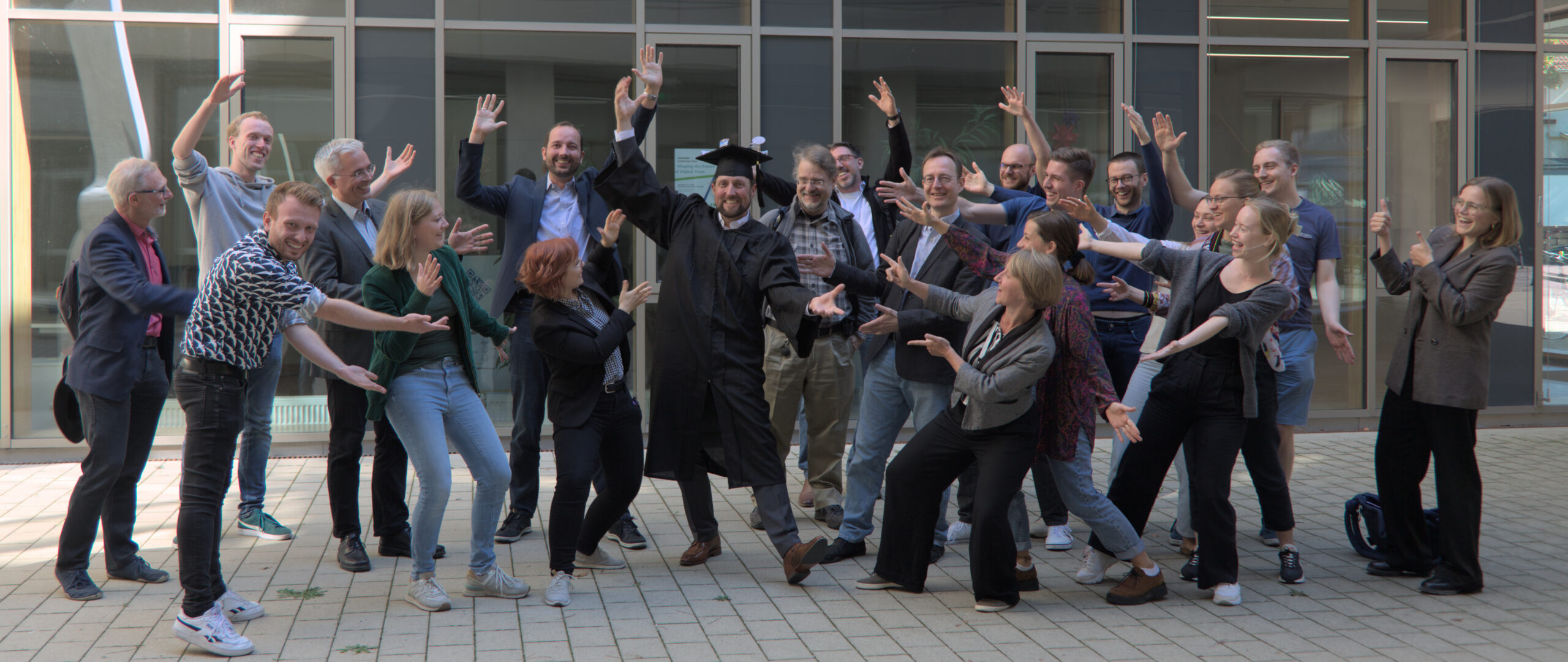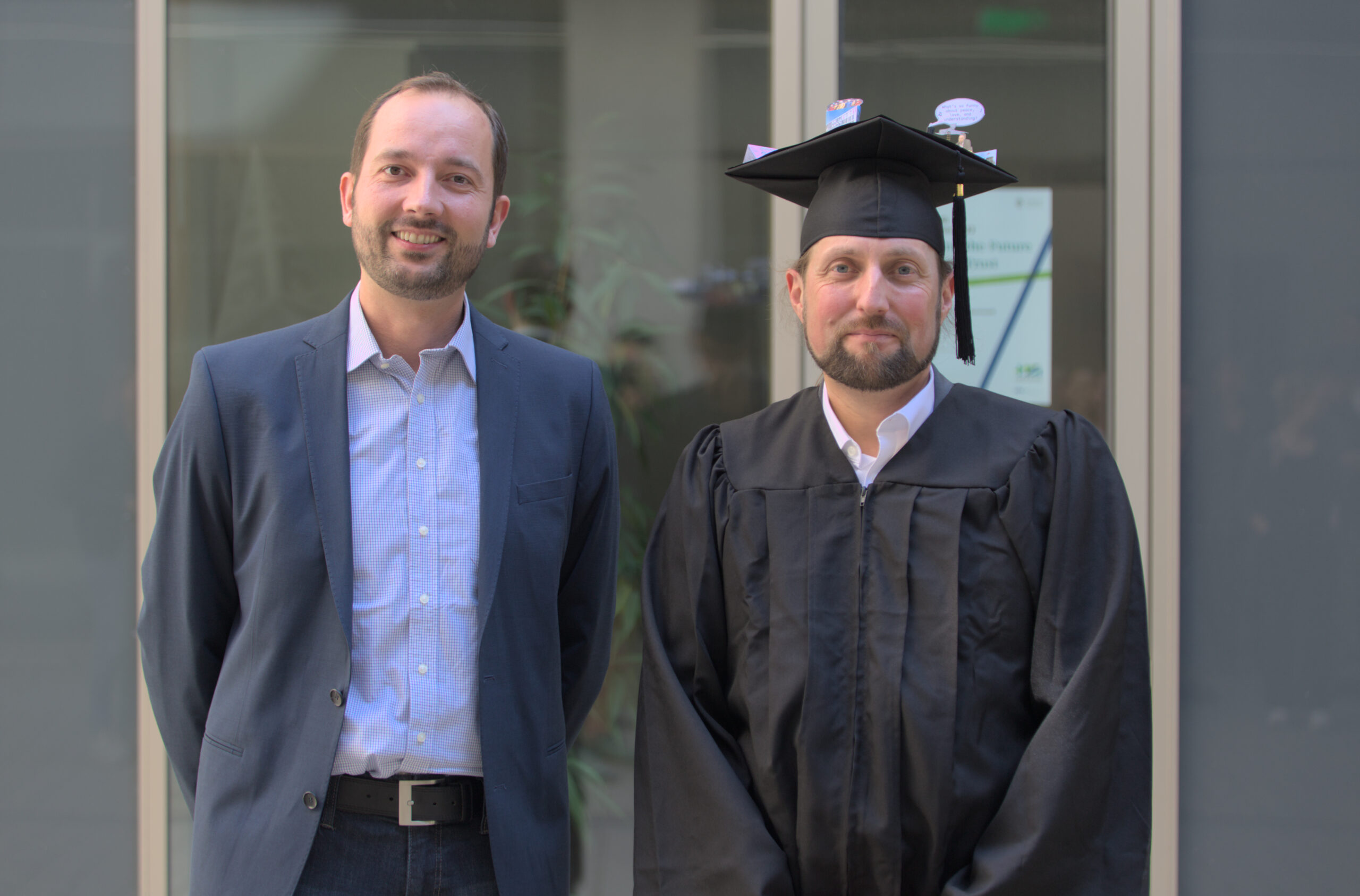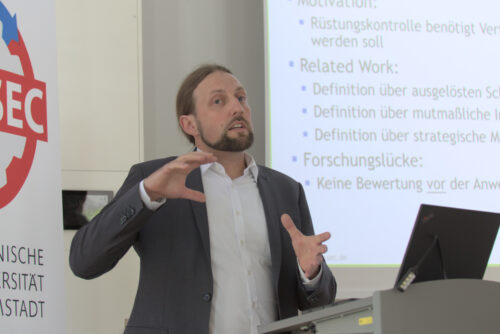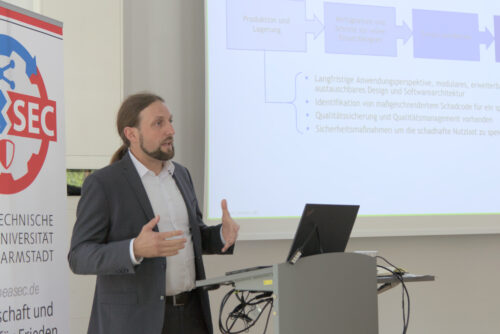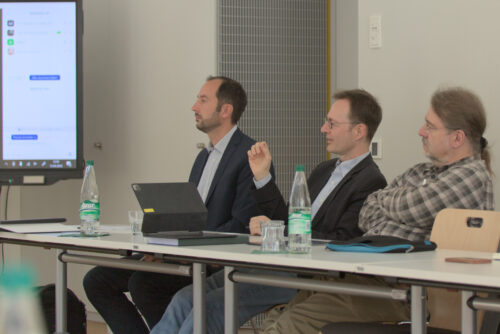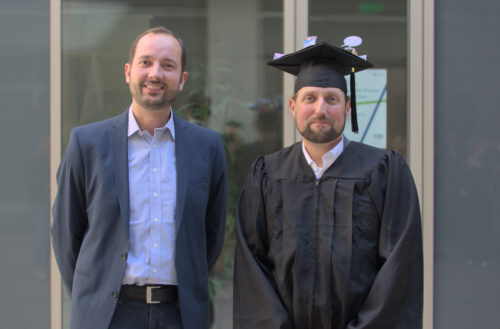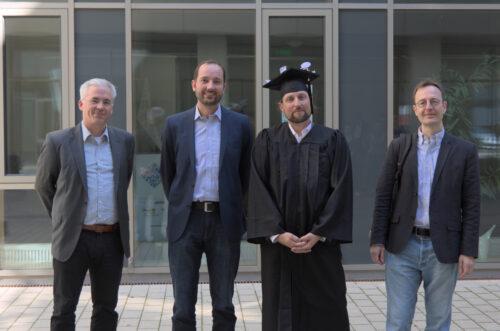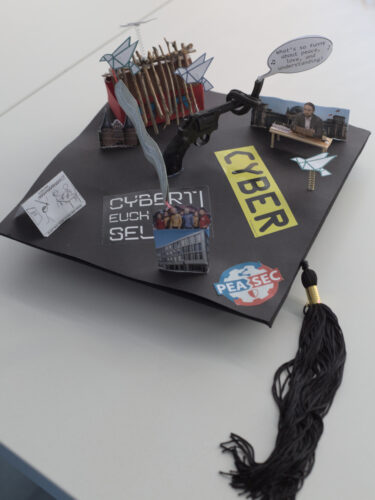Thomas Reinhold hat am Freitag, den 15. September 2023 mit seiner Disputation den letzten Teil auf dem Weg zum „Dr. rer. nat.“ am Fachbereich Informatik der Technischen Universität Darmstadt bestanden. Seine Dissertation “Towards a Peaceful Development of Cyberspace – Challenges and Technical Measures for the De-escalation of State-led Cyberconflicts and Arms Control of Cyberweapons” wurde von Prof. Dr. Dr. Christian Reuter betreut, der auch als Erstreferent fungierte. Korreferent war Prof. Dr.-Ing. Volker Roth (Fachgebiet Secure Identity an der Freien Universität Berlin). Die mündliche Prüfung mit den Referenten sowie den weiteren Prüfern Prof. Dr.-Ing. Thomas Schneider (Praktische Kryptographie und Privatheit) sowie Prof. Dr. Jörn Kohlhammer (Informationsvisualisierung und Visual Analytics) fand unter dem Vorsitz von Prof. Dr.-Ing. Andreas Koch (Eingebettete Systeme und ihre Anwendungen) statt.
Das gesamte PEASEC-Team gratuliert Dr. Thomas Reinhold herzlich zu der erfolgreichen Verteidigung seiner Doktorarbeit!
Towards a Peaceful Development of Cyberspace – Challenges and Technical Measures for the De-escalation of State-led Cyberconflicts and Arms Control of Cyberweapons
Cyberspace, already a few decades old, has become a matter of course for most of us, part of our everyday life. At the same time, this space and the global infrastructure behind it are essential for our civilizations, the economy and administration, and thus an essential expression and lifeline of a globalized world. However, these developments also create vulnerabilities and thus, cyberspace is increasingly developing into an intelligence and military operational area – for the defense and security of states but also as a component of offensive military planning, visible in the creation of military cyber-departments and the integration of cyberspace into states’ security and defense strategies.
In order to contain and regulate the conflict and escalation potential of technology used by military forces, over the last decades, a complex tool set of transparency, de-escalation and arms control measures has been developed and proof-tested. Unfortunately, many of these established measures do not work for cyberspace due to its specific technical characteristics. Even more, the concept of what constitutes a weapon – an essential requirement for regulation – starts to blur for this domain. Against this background, this thesis examines how measures for the de-escalation of state-led conflicts in cyberspace and arms control of cyberweapons can be developed.
In order to answer this question, the dissertation takes a specifically technical perspective on these problems and the underlying political challenges of state behavior and international humanitarian law in cyberspace to identify starting points for technical measures of transparency, arms control and verification. Based on this approach of adopting already existing technical measures from other fields of computer science, the thesis provides proof of concepts approaches for some mentioned challenges like a classification system for cyberweapons that is based on technical measurable features, an approach for the mutual reduction of vulnerability stockpiles and an approach to plausibly assure the non-involvement in a cyberconflict as a measure for de-escalation.
All these initial approaches and the questions of how and by which measures arms control and conflict reduction can work for cyberspace are still quite new and subject to not too many debates. Indeed, the approach of deliberately self-restricting the capabilities of technology in order to serve a bigger goal, like the reduction of its destructive usage, is yet not very common for the engineering thinking of computer science. Therefore, this dissertation also aims to provide some impulses regarding the responsibility and creative options of computer science with a view to the peaceful development and use of cyberspace.
Ausgewählte Veröffentlichungen im Rahmen der Promotion:
- Reinhold, T., Kühn, P., Günther, D., Schneider, T., & Reuter, C. (2023). EXTRUST: Reducing Exploit Stockpiles With a Privacy-Preserving Depletion System for Inter-State Relationship. IEEE Transactions on Technology and Society. https://doi.org/10.1109/TTS.2023.3280356
- Reinhold, T., & Reuter, C. (2021). Towards a Cyber Weapons Assessment Model – Assessment of the Technical Features of Malicious Software. IEEE Transactions on Technology and Society, 3(3), 226–239. https://doi.org/10.1109/TTS.2021.313 1817
- Franken, J., Reinhold, T., Reichert, L., & Reuter, C. (2022). The Digital Divide in State Vulnerability to Submarine Communications Cable Failure. International Journal of Critical Infrastructure Protection, 38. https://doi.org/10.1016/j.ijcip.20 22.100522
- Reinhold, T., & Reuter, C. (2023). Preventing the Escalation of Cyber Conflicts: Towards an Approach To Plausibly Assure the Non-Involvement in a Cyberattack. Zeitschrift für Friedens-und Konfliktforschung (ZeFKo). https://doi.org/10.1007 /s42597-023-00099-7
- Reinhold, T., Pleil, H., & Reuter, C. (2023). Challenges for Cyber Arms Control: A Qualitative Expert Interview Study. Zeitschrift für Außen- und Sicherheitspolitik (ZfAS). https://doi.org/10.1007/s42597-023-00094-y
- Reinhold, T., & Reuter, C. (2023b). Zur Debatte über die Einhegung eines Cyberwars: Analyse militärischer Cyberaktivitäten im Krieg Russlands gegen die Ukraine. Zeitschrift für Friedens- und Konfliktforschung (ZeFKo). https://doi.org/10.1007 /s42597-023-00094-y
- Reinhold, T., & Reuter, C. (2019a, March 13). Arms Control and its Applicability to Cyberspace. In C. Reuter (Ed.), Information Technology for Peace and Security: IT Applications and Infrastructures in Conflicts, Crises, War, and Peace (pp. 207– 231). Springer Vieweg. https://doi.org/10.1007/978-3-658-25652-4_10
- Reinhold, T., & Reuter, C. (2022). Cyber Weapons and Artificial Intelligence: Impact, Influence and the Challenges for Arms Control. In T. Reinhold & N. Schörnig (Eds.), Armament, Arms Control and Artificial Intelligence: The Janus-faced Nature of Machine Learning in the Military Realm (pp. 145–158). Springer International Publishing. https://doi.org/10.1007/978-3-031-11043-6_1 1

